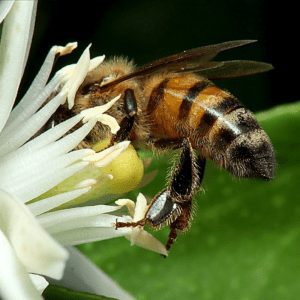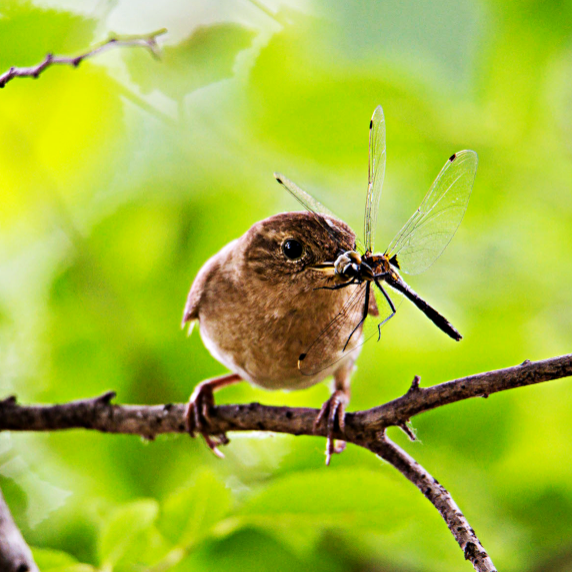Pollinators & Pesticides
 Pervasive pesticide use around the country threatens essential pollinators and the broader web of life – including humans. PEER highlights key new science and exposes Administration coverups of the dangers.
Pervasive pesticide use around the country threatens essential pollinators and the broader web of life – including humans. PEER highlights key new science and exposes Administration coverups of the dangers.
Increasing evidence shows that the bees, moths, butterflies, and other species responsible for pollinating more than two-thirds of the world’s food crops are dwindling at startling rates. And while habitat loss and climate change are important drivers of these losses, the nationwide use of persistent, highly toxic, poorly-regulated pesticides has rightly attracted the concern of many scientists working in federal agencies like EPA — agencies that, while charged with regulating the pesticide industry and ensuring safety, seem all-too-willing to act in the best interests of those very industries. Not only pollinators are at risk. Aquatic invertebrates, birds, bats, and indeed whole ecosystems – even human health – are under threat.
PEER networks with individual scientists working in public agencies and land-grant universities and offers them legal and other support so that their research and careers can continue undisturbed. We have a long history of defending and assisting such scientists, including pollinator experts, whether in personnel actions if it comes to that or in more behind-the-scenes ways.
Neonicotinoid Insecticides
 We have kept the pressure on EPA to further restrict neonicotinoids by pursuing Freedom of Information Act requests that revealed the great extent to which State agriculture agencies themselves oppose the current unrestricted planting of seeds coated with those insecticides. We uncovered that State FIFRA Research and Evaluation Group (SFIREG) report calling for tighter regulation of them. We have sent letters and pursued meetings with the leaders of EPA’s Office of Pesticide Programs, pushing for tighter regulations. This followed EPA’s release of detailed Endangered Species Act (ESA) assessments it has been drafting since 2019. The agency’s own analysis shows the three main neonicotinoids (clothianidin, thiamethoxam, and imidacloprid) each will drive more than 200 ESA-listed species of plants and animals across all major taxonomic groups into jeopardy of extinction if users continue to apply them nationwide. We are urging EPA to call a halt to this damage. Read More»
We have kept the pressure on EPA to further restrict neonicotinoids by pursuing Freedom of Information Act requests that revealed the great extent to which State agriculture agencies themselves oppose the current unrestricted planting of seeds coated with those insecticides. We uncovered that State FIFRA Research and Evaluation Group (SFIREG) report calling for tighter regulation of them. We have sent letters and pursued meetings with the leaders of EPA’s Office of Pesticide Programs, pushing for tighter regulations. This followed EPA’s release of detailed Endangered Species Act (ESA) assessments it has been drafting since 2019. The agency’s own analysis shows the three main neonicotinoids (clothianidin, thiamethoxam, and imidacloprid) each will drive more than 200 ESA-listed species of plants and animals across all major taxonomic groups into jeopardy of extinction if users continue to apply them nationwide. We are urging EPA to call a halt to this damage. Read More»
PEER Urges EPA Reforms for Bee and Bird-Killing Pesticides
 PEER and the American Bird Conservancy are spearheading a formal rulemaking petition with EPA on behalf of 65 non-profit groups proposing major reforms in the way the agency regulates systemic insecticides with a focus on the neonicotinoids, which have caused excessive honey bee deaths since their introduction more than 20 years ago. Extensive new knowledge now exists on how these long-lasting “systemic” insecticides harm birds, bats, pollinators, other beneficial insects, and aquatic invertebrates. We are petitioning EPA to discard a 1984 regulatory waiver that allowed companies to register pesticides without first submitting “efficacy” data showing that the product provides claimed benefits. Instead of requiring data on the costs versus the benefits of a pesticide application, the Reagan-era EPA declared: “rather than require efficacy data the Agency presumes that benefits exceed risks”.
PEER and the American Bird Conservancy are spearheading a formal rulemaking petition with EPA on behalf of 65 non-profit groups proposing major reforms in the way the agency regulates systemic insecticides with a focus on the neonicotinoids, which have caused excessive honey bee deaths since their introduction more than 20 years ago. Extensive new knowledge now exists on how these long-lasting “systemic” insecticides harm birds, bats, pollinators, other beneficial insects, and aquatic invertebrates. We are petitioning EPA to discard a 1984 regulatory waiver that allowed companies to register pesticides without first submitting “efficacy” data showing that the product provides claimed benefits. Instead of requiring data on the costs versus the benefits of a pesticide application, the Reagan-era EPA declared: “rather than require efficacy data the Agency presumes that benefits exceed risks”.
The Petition documents how EPA’s shocking 1984 presumption and its subsequent failure to require efficacy data has led to extensive environmental harm, including the overproduction of thousands of tons of surplus neonicotinoid-coated seeds that were never planted and have contaminated the environment. Read More»
Webinar – EPA’s Broken Pesticides Program

With the Biden administration promising to “protect scientists from political interference and ensure they can think, research, and speak freely to provide valuable information and insights to the American people,” now is the time to push for immediate changes in the Environmental Protection Agency’s (EPA) pesticide programs.
The discussion focused on how EPA’s actions are poisoning people and wildlife and our soil, water and air as well as responded to questions from the webinar participants. Watch the Webinar »